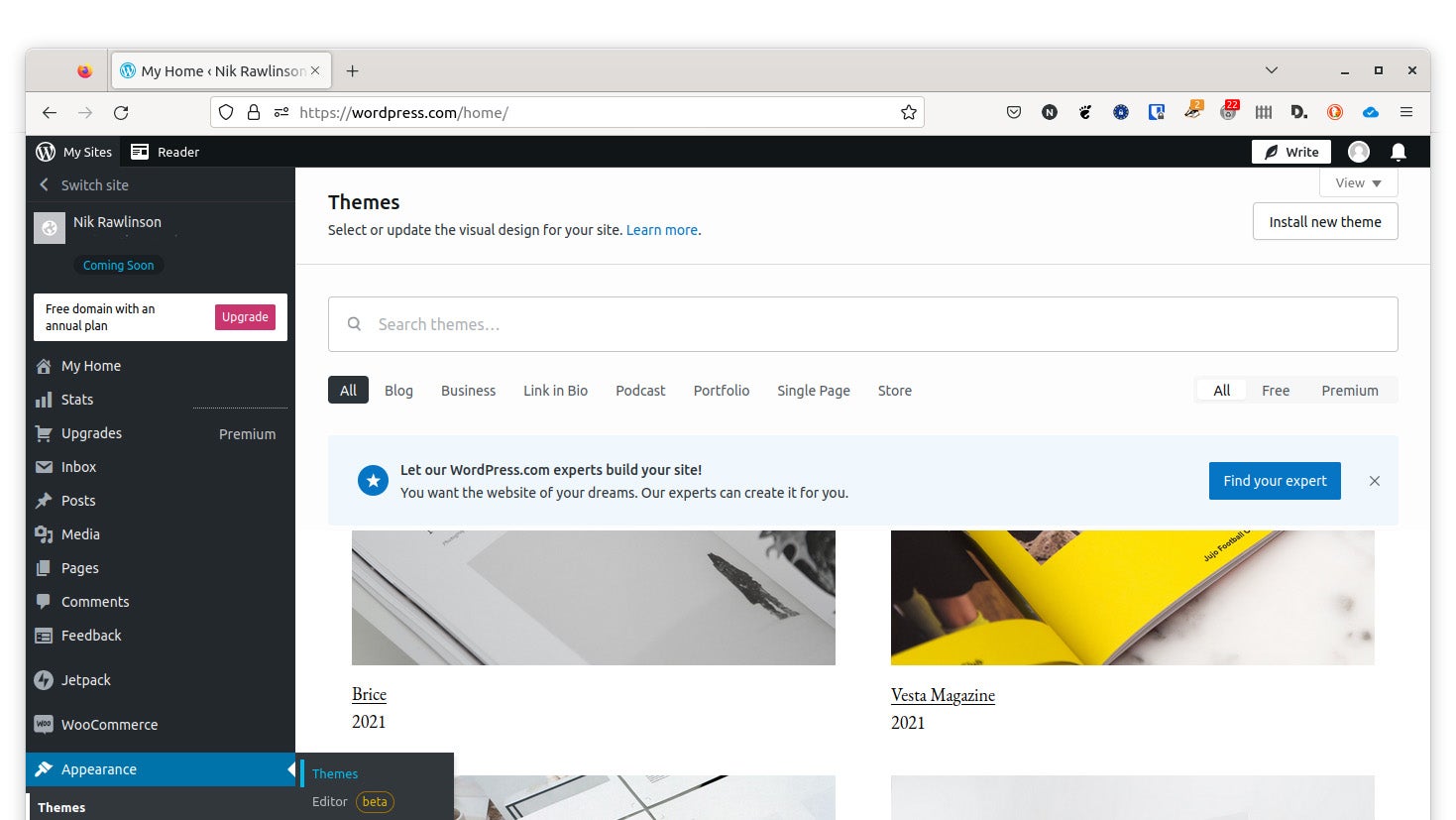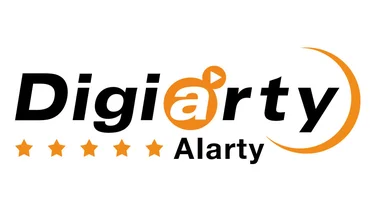To help us provide you with free impartial advice, we may earn a commission if you buy through links on our site. Learn more
- WordPress review: What do you get for the money?
- WordPress review: Hosting fundamentals
- WordPress review: How easy is it to set up?
- WordPress review: Is it easy to build a website?
- WordPress review: Is email included?
- WordPress review: How much do other options cost?
- WordPress review: Should you sign up?

- Simple setup
- Certainty of always running most recent, fully patched version of WordPress
- Inability to install plug-ins without upgrading to more expensive plans
- No bundled email
WordPress powers more than 40% of the web. It underpins blogs and newspapers, online forums and photo-sharing sites, and it isn’t uncommon for web hosts to offer dedicated WordPress hosting packages. Even those who don’t understand its appeal – many offer WordPress installation as a one-click option from their hosting dashboards.
They can do this because the WordPress engine is an open-source project that anyone is free to download and install, without payment or subscription.
WordPress review: What do you get for the money?
As well as managing the CMS itself, the company behind it, Automattic, also offers hosting plans of its own via WordPress. There are five tiers to choose from, plus a custom solution called WordPress VIP that’s used to run enterprise-scale sites, for which pricing starts at $25,000 a year.
We’re looking at the Premium tier for this review, which WordPress badges as “popular” and states is best for freelancers. Below this sits Personal – for individual use – and above you’ll find Business and eCommerce options, for small businesses and larger online stores respectively. There’s also a free tier for anyone who wants to dip their toe in the water. While this makes it easy to get up and running quickly, we’d recommend picking a paid plan, for reasons we’ll explain later on.
You can opt for annual or monthly billing, with the former attracting a big discount. As an example, the Premium WordPress plan costs £17 per month (£204 annually) while the yearly plan costs £84, which works out at just £7 per month.
Your choice here also affects the level of support you can expect, as signing up for monthly billing means you lose access to live chat support, which is otherwise available on the Premium and higher tiers, leaving email support your only option.
READ NEXT: The best web hosts
WordPress review: Hosting fundamentals
The Premium plan includes 13GB of web space and, if you’re paying annually, a free domain. Opt for monthly billing and you’ll have to budget for a domain on top, unless you already have one. Being tightly focused and easy to use, WordPress Premium comes with WordPress pre-installed.
SSL is applied on day one, courtesy of a certificate from Let’s Encrypt, and you also benefit from Jetpack Essentials. Jetpack is a WordPress add-on that performs various administrative tasks, depending on the version you install. In this case, its focus is on improving site performance, protecting your site from spammers, enhancing SEO, automating social sharing, and tracking on-site activity. Premium users don’t get the benefit of Jetpack’s automated backups, which are only available on the Business and eCommerce tiers.
WordPress review: How easy is it to set up?
If you don’t register a domain through WordPress, you can transfer an existing domain, in which case it will be renewed for a year. Alternatively, you can leave it where it is and point it at WordPress by updating its nameserver settings.

The onboarding process is simple and clearly explained, and includes optionally drafting your first post, watching videos to learn the basics, and choosing a design from one of the thousands of bundled themes. As a Premium user you also get access to premium themes, which are locked away for Free and Personal tier members. You can preview any theme – including free options – in desktop, tablet and mobile configurations, and click through as many as you need until you find one you like. Don’t worry if you can’t quite find what you’re after right away: you can switch to a different theme later if you find something better.
READ NEXT: The best business broadband deals
WordPress review: Is it easy to build a website?
The WordPress software is a flexible and powerful site-building engine. Over recent years, it’s become increasingly capable in this respect, with the block editor introduced in version five simplifying the process of embedding and ordering different content types, and helping even novice users without any coding experience to break away from repetitive layouts to produce pages that are the best fit for their content.

If you’re comfortable wrangling CSS, you can use it to customise your site with Premium hosting and above, so you can tweak colours – as an example – to match your existing branding.
Unfortunately, Premium tier users can’t install their own plug-ins, which we think is a shortcoming; plug-ins can greatly enhance a site’s flexibility and interactivity, as well as its ability to more specifically satisfy an audience’s requirements. As WordPress itself says, plug-ins let you “transform your site into a mobile app, a job board, a wiki, or a coupon site”, “build a professional photography site with beautiful photo galleries”, and “fully optimise your site for search engines with advanced options”.
The ability to do all of this – and more – without any back-end tweaking is one of the strengths of the WordPress platform, and one of its major draws, so to restrict plug-ins to the pricier Business and eCommerce plan, is disappointing. As such, it’s tempting to look again at a regular web host with one-click WordPress installers, and no restriction on plug-in use, which you should be able to find for significantly less.
WordPress review: Is email included?
Email isn’t included by default, but you can add it to your domain at £33 per mailbox per year, with your first three months free (for a first-year price of £24.75, which is charged after the free period). This gets you email, calendar and contact hosting, plus 30GB of storage.
READ NEXT: Our favourite Apple, Windows and Chrome OS laptops
WordPress review: How much do other options cost?
WordPress offers a free tier, with which you can quickly establish a site within a subdomain of its own wordpress.com domain. You get an SSL certificate, Jetpack essentials, and access to free themes; but you’ll also get WordPress ads and no support, which is the reason we’d recommend upgrading to a paid account.
Prices start at £8 per month (or £36 annually) for the basic ‘Personal’ plan, which gets you unlimited email support and upgrades your storage from 1GB to 6GB.
The Premium tier costs £7 a month if you sign up for a year (annual cost of £84) or £17 a pop if you want to pay monthly, for an overall annual bill of £204 a year. As mentioned above, if you opt for monthly billing, you don’t qualify for a free domain or live chat support – this is true of all plans.
Every paid plan – even the cheapest Personal tier – opts you out of WordPress advertising, but it’s worth mentioning that Premium still includes a WordPress credit at the bottom of every page. Again, this can only be removed if you sign up for the Business or eCommerce plans.

Premium also bags you premium themes – which aren’t available on the free or Personal tiers – the ability to customise your site using CSS, Google Analytics integration, VideoPress integration (for embedding videos in a native player), and PayPal button support to simplify online selling. However, the inability to install your own plugins, upload your own themes, and compulsory WordPress branding in the footer does increase the appeal of a regular web host with its own WordPress support.
If you wanted these features, you’d need to upgrade to the Business tier, at £240 per year. Alternatively, you could take a look at Ionos’ Grow WordPress Hosting plan. This costs £9.60 per month (£115 per year), discounted to £1.20 per month (£14.40 total) for the first year, and gets you 50GB of web space, five email accounts with 2GB of storage apiece, daily backups and recovery. This is on top of a year’s optional daily Jetpack backups, round-the-clock customer support, and the ability to install themes and plug-ins.
WordPress review: Should you sign up?
WordPress is among the most robust, easiest to use, and most flexible web publishing options available, all of which contributes to its popularity. However, this popularity also means that it’s well supported by a wide range of third-party providers and web hosts, with which WordPress is competing. While it’s comforting and, in many ways, sensible to source your CMS and hosting from a single provider, since it gives you a high degree of certainty that you’ll always be running the most recent, patched release, it’s also difficult to ignore the fact that savings could be made by sourcing a similar setup elsewhere.
While easy to set up and use, WordPress Premium hosting isn’t great value for money when you compare what freeform hosts with WordPress installers offer for around the same price.
That said, if your site is entirely WordPress-based, and convenience is your primary concern, there’s a lot to be said for the peace of mind you’ll get from buying your hosting and CMS from a single source, and knowing that you should always be fully patched and running the most recent build.






